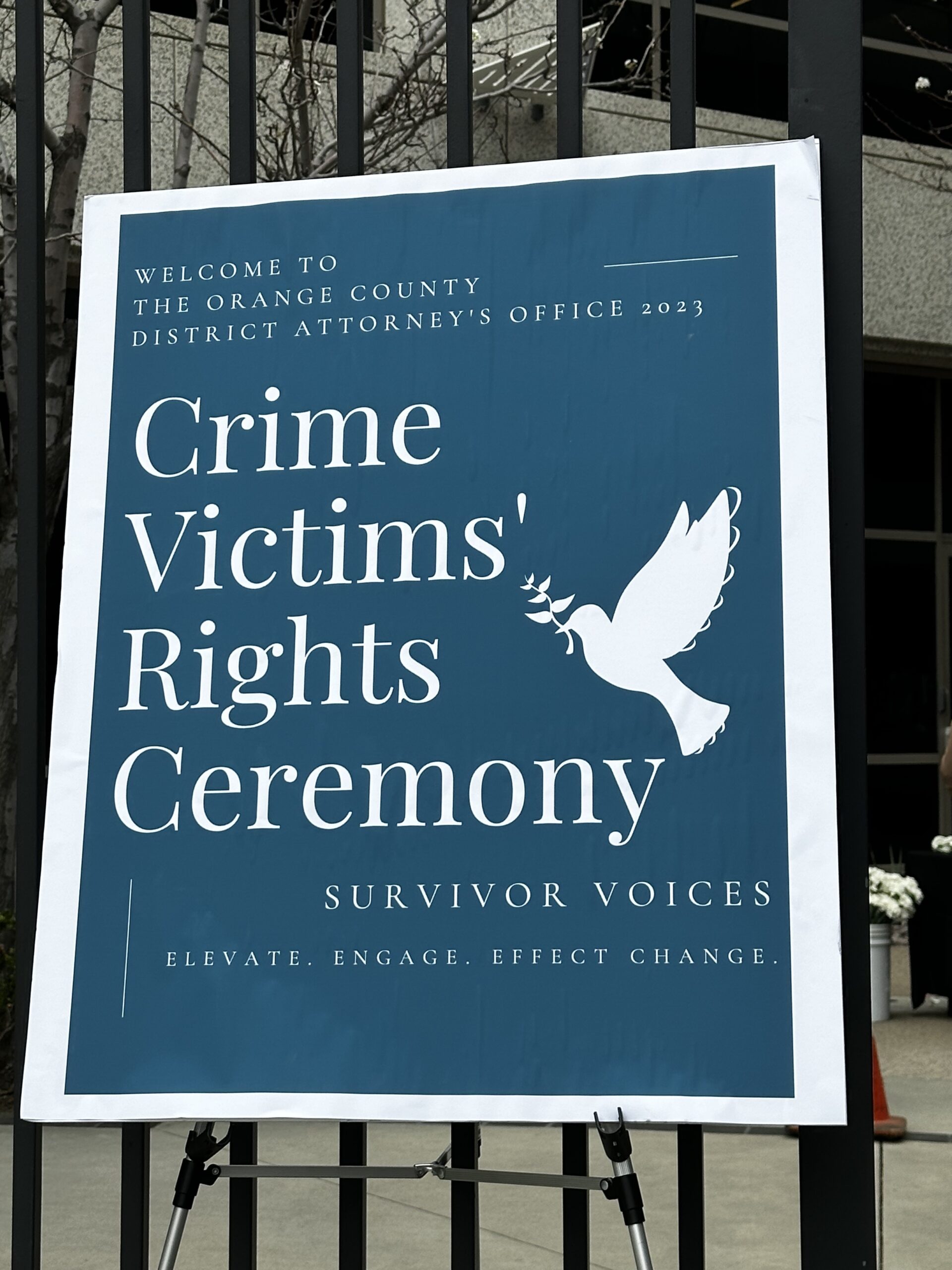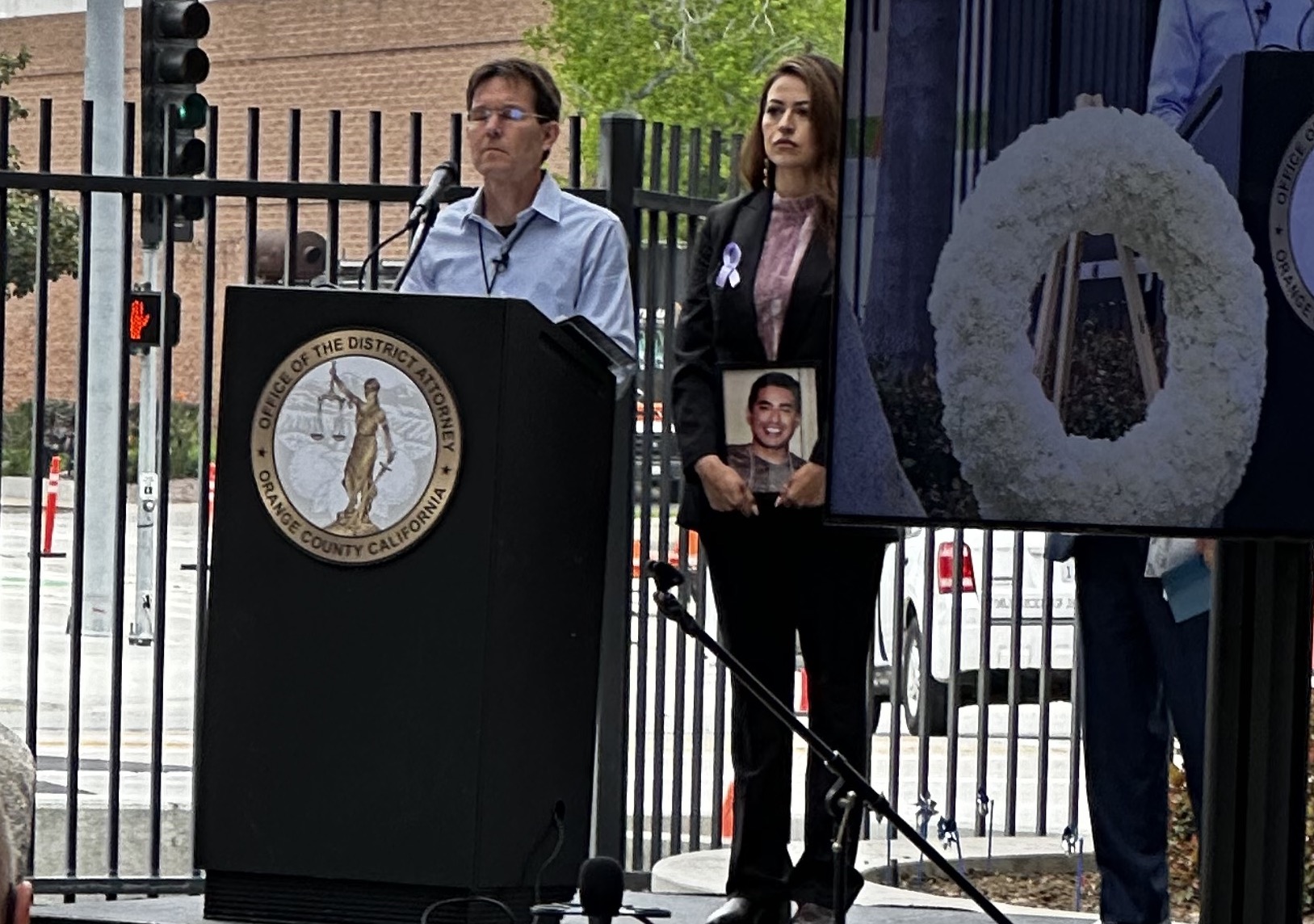The 2023 Orange County Crime Victims’ Ceremony was held in Santa Ana, California where there was a focus on fentanyl victims. The event was held to honor and remember those who have lost their lives as victims of crime. Many who attended the ceremony held photos of their lost loved ones and those honoring fentanyl victims wore lavender ribbons.
Matt Capelouto, whose daughter was murdered by a fentanyl dealer who sold her a counterfeit pill, spoke at the event and talked about how he wishes he didn’t have to be there. He expressed his frustration about bills getting stuck in committee in Sacramento and how the bill named after his daughter, Alexandra, aka SB44, would have passed on the house floor with 21 votes if it weren’t for partisan politics. He also announced FentanylSolution.org’s Poll-to-Prop initiative, which aims to take the vote to the people if legislators in Sacramento won’t do their job. Click the link here to view the video – https://youtube.com/shorts/wCycXyjau44.
Fentanyl is a potent synthetic opioid that has become a significant public health concern in recent years. Its impact has been devastating, leading to countless deaths and causing immeasurable pain to families and communities. The Orange County Crime Victims’ Ceremony serves as a reminder of the importance of addressing crime at large, including fentanyl, and the need for policy changes to prevent further harm.
FentanylSolution.org is an organization that is working to fight against the Fentanyl crisis. Through education, awareness, and advocacy, they hope to increase understanding of the dangers of Fentanyl and promote policy changes that focus on harm reduction and prevention. Our $2.2 million Poll-to-Prop ballot initiatives would give drug dealers longer prison sentences for murdering people with fentanyl. To donate to this initiative, email info@FentanylSolution.org for more information.



Grammy Award-winning rapper, Coolio’s cause of death has been revealed as a fentanyl overdose, according to a recent report by CNN and The New York Times. The rapper, whose real name is Artis Leon Ivey Jr., passed away on September 28, 2022, at the age of 59.

© Alex Valentovich / New Fury Media / Riot Fest Chicago 2022
The New York Times reported that Coolio had tested positive for fentanyl, a synthetic opioid that is 50 times more potent than heroin, 100 times more potent than morphine (CDC) and has been responsible for a surge in overdose deaths in recent years. The amount of fentanyl detected in Coolio’s system was small, but it was determined to be the cause of death, along with coronary artery disease.
Coolio rose to fame in the 90s with hits such as “Gangsta’s Paradise,” which won a Grammy for Best Rap Performance in 1996. He was also known for his appearances on reality shows such as “Celebrity Big Brother” and “Wife Swap.” His death was met with an outpouring of condolences from fans and fellow artists.

So many families including Coolio’s have suffered the loss of their loved ones. The revelation of Coolio’s fentanyl overdose highlights the ongoing opioid epidemic in the United States, where thousands of people die every year due to opioid-related overdoses (CDC).
Fountain Valley Officials Applaud Naloxone Program at Area SchoolsAt the first Fountain Valley mayor’s breakfast of the year, held on March 30 at Fountain Valley Regional Hospital in Orange County, California, several local issues were discussed, including a recently established drug program in schools. The program, which was initiated last November, aims to prevent overdoses in youth by placing drug stations with naloxone, a nasal spray that can reverse the effects of opioids, in schools. The program comes in response to the growing number of children overdosing on fentanyl across the state and country.
Why is this program important?
The opioid crisis has become a major concern in many communities, and youth are particularly vulnerable to its effects. Illicit drugs laced with fentanyl, a powerful synthetic opioid, are increasingly being sold to unsuspecting youth, often through social media platforms. This has led to a rise in overdoses among young people, including in schools. The drug program in Fountain Valley schools aims to address this issue and provide a timely response to overdoses, potentially saving lives.
What does the program involve?
The program involves placing naloxone stations in each elementary school, middle school, and high school in the Fountain Valley area. These stations are equipped with naloxone, a medication that can quickly reverse the effects of opioids and prevent overdose deaths. The naloxone is administered through a nasal spray, making it easy to use by school staff or other trained personnel in case of an emergency. The program was initiated by the Fountain Valley Fire Department and Emergency Medical Services teams, in collaboration with city officials.
Success of the program
Since its implementation, the program has already proven successful in saving a student’s life. In January, a student at Ocean High School who had taken an unknown substance bought off the street that was laced with fentanyl was administered naloxone by a teacher, according to Fountain Valley Fire Department Chief Bill McQuaid. The timely treatment with naloxone, also known as Narcan, saved her life, highlighting the importance of having naloxone stations in schools.

Why is this program necessary?
Lauren Lee, a former emergency room nurse who developed the plan for the school stations and currently serves as the Emergency Medical Services manager for the city fire department, emphasizes the importance of the program for student safety. She notes that a growing number of kids, including those in elementary school and older, are buying illicit drugs from dealers on social media sites, often through platforms like Snapchat. These drugs are sometimes misrepresented as harmless, such as marijuana gummies, when in fact they are laced with dangerous opioids like fentanyl. The presence of naloxone stations in schools can provide a crucial intervention in case of an overdose, potentially saving lives.
In conclusion, the drug program implemented in Fountain Valley schools to prevent overdoses in youth is a timely and important initiative. With the opioid crisis affecting communities across the country, it’s crucial to have measures in place to address the growing number of overdoses, including among young people. The presence of naloxone stations in schools can provide a lifeline in case of an overdose, potentially saving lives and protecting the well-being of students. As the program continues to be implemented and expanded, it is hoped that the need for naloxone stations in schools will decrease in the future, reflecting a reduction in overdoses and improved awareness about the dangers of opioids among youth. In the meantime, the program serves as a valuable resource to protect the health and safety of students in Fountain Valley schools. So far, the program has already demonstrated success in saving lives, and its continued implementation and expansion are critical in addressing the ongoing opioid crisis and protecting our youth.
Alexandra’s Law Fails in Senate Committee: What This Means for the Fentanyl EpidemicAlexandra’s Law Fails in Senate Committee: What This Means for the Fentanyl Epidemic
On Tuesday, Senate Bill SB 44, also known as Alexandra’s Law, failed to pass in the Senate Public Safety Committee. The bill, jointly authored by Senators Umberg & Ochoa Bogh, proposed implementing a fentanyl admonishment in California to address the growing opioid crisis.
The bill required issuing a written advisory or admonishment to a person convicted of a fentanyl-related drug offense, informing them of the dangers of manufacturing and distributing controlled substances, and potential criminal liability if someone dies due to their actions. However, the bill did not pass the committee, though it was granted reconsideration for a later hearing.
Why Is Alexandra’s Law So Important?
Fentanyl is an opioid 50-100 times more potent than morphine, with a rapid onset and short duration of action. It has become increasingly prevalent in street drugs and has been responsible for thousands of deaths across the U.S.
California alone accounts for approximately 11.5% of the 101,751 drug overdose deaths that occurred in the U.S. in the 12-month period ending in October 2022 (CDC).
The impact of fentanyl is devastating, with youth under age 24 accounting for the fastest rise in drug deaths. In California, a young person under 24 is dying from fentanyl every 12 hours. The biggest factor attributing to this danger is the undisclosed addition of fentanyl to other drugs, leading to fentanyl poisoning and death.
Fentanyl is the lead killer of teens in Orange County and of individuals between the ages of 18-45 in the U.S.
What Would Alexandra’s Law Do?
The proposed law would require an admonishment to be issued to anyone convicted of a fentanyl-related drug offense. This written advisory would inform them of the dangers of manufacturing and distributing controlled substances and potential criminal liability if another person dies due to their actions. The goal of the law is to hold predatory dealers accountable for the destruction they are causing and deter people from trafficking fentanyl.
What Are the Consequences of Failing to Pass Alexandra’s Law?
The failure to pass Alexandra’s Law is a significant blow to efforts to address the fentanyl epidemic. Without a comprehensive approach, it is challenging to curb the increase in fentanyl-related deaths. The bill’s authors and supporters believe that the fentanyl crisis requires a multifaceted approach, including education, law enforcement, and harm reduction angles, to tackle the issue comprehensively.

What Can We Do?
While the failure of Alexandra’s Law is disappointing, we can still take action to address the fentanyl epidemic. Here are some things we can do:
- Spread awareness: Educate yourself and others about the dangers of fentanyl and how to recognize the signs of an overdose.
- Advocate for change: Contact your representatives and urge them to support legislation to address the fentanyl epidemic.
- Get help: If you or someone you know is struggling with addiction, seek help from a healthcare professional or a support group.
The fentanyl epidemic is a growing problem that requires immediate action. While Alexandra’s Law may not have passed this time, we must continue to fight for solutions that will save lives and keep our communities safe.
FentanylSolution.org officially supported this bill with other important organizations such as the Association of Orange County Deputy Sheriffs, CA Coalition of School Safety Professionals, Drug Awareness Foundation, and California District Attorneys Association. The Mayors of Anaheim, Bakersfield, Corona, Irvine, Fontana, Fresno, Lake Elsinore, Murrieta, Menifee, Norco, Perris, Riverside, Sacramento, San Francisco, San Jose, Stockton and Temecula also showed their support.
In addition, our President and CEO, Janice M. Celeste, was in Sacramento at the California State Capital to support this bill and the parents who have lost a child to fentanyl poisoning.
U.S. Targets Sinaloa Cartel’s Fentanyl Trade with Asset Freeze and Prohibition on TransactionsThe U.S. Department of the Treasury’s Office of Foreign Assets Control has designated six Sinaloa Cartel members and six Mexico-based entities involved in the illicit fentanyl and methamphetamine trade. This action is part of a whole-of-government effort to disrupt and dismantle the transnational criminal organizations that facilitate the illicit supply of fentanyl and other narcotics.
The designation includes freezing the assets of the cartel members and entities and prohibiting any U.S. persons from engaging in transactions with them. These measures can significantly hurt, stop, or slow down the cartels’ activities, ultimately disrupting the production and supply chain of illicit fentanyl and other drugs. “This is an impactful step toward hindering the cartels’ ability to make counterfeit pills laced with illicit fentanyl,” said Janice Celeste, the President & CEO of FentanylSolution.org. “There is still more than must be done. We can’t stop here.”

Also, by prohibiting anyone from the U.S. from engaging in transactions with the designated individuals and entities can severely restrict the cartels’ ability to do business with legitimate companies or financial institutions. This will limit their opportunities to launder money, transfer funds, or invest their profits, ultimately making it harder for them to import or export goods or services, such as equipment or raw materials.
“This is an impactful step toward hindering the cartels’ ability to make counterfeit pills laced with illicit fentanyl,” said Janice Celeste, the President & CEO of FentanylSolution.org. “There is still more that has to be done. We can’t stop here.”
Furthermore, the reputational damage from the designation can make it harder for the designated individuals and entities to establish alliances with other criminal groups or bribe officials. It can also signal to other criminal actors that they are not immune to U.S. law enforcement actions and that their illicit activities will not be tolerated.
The United States government has declared a commitment to disrupting the global production and supply chain of illicit fentanyl, including denying criminal actors who engage in this activity access to the international financial system. The OFAC’s designation of the six Sinaloa Cartel members and six Mexico-based entities is a significant step towards achieving this goal and sends a clear message that the U.S. government is prepared to take action to dismantle the production and supply chain of illicit drugs, ultimately reducing the harm caused by these drugs.

